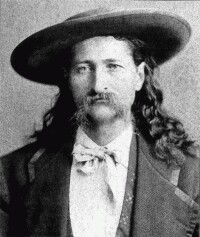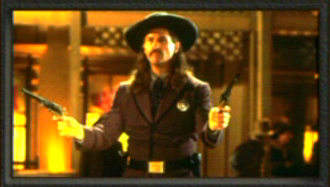Wild Bill (1995) from Johnny Web (Uncle Scoopy; Greg Wroblewski) |
|
His real name was James Butler Hickok, but history has brought him to us as "Jimbo." Why the author of this film chose to call him "Wild Bill" is anyone's guess. Hickok was like a lot of men who fought in the War Between The States and had no interest in rejoining civilized society when the great conflict was over, so he forged a life satisfactory to himself out West. That basically consisted of ridin' from town to semi-lawless town, gamblin', drinkin', and whorin', and occasionally (and very briefly) taking a job as a lawman when it seemed like the right thing to do. The territories really were wild in the late 1860s and 70s, and there were plenty of Eastern authors who wandered out there to sample the flavors of the West and to report back to readers hungry for romantic tales. The writers interviewed the locals, and the responses included a bizarre admixture of truth, oft-repeated legends, and outright fabrications. Sometimes people just got tired of talking to reporters and told them what they wanted to hear. Wild Bill Hickok was one of those people. He told some writers that he had killed "hundreds" of men, and that became the legend of Wild Bill. Harper's New Monthly Magazine published a story about him in February 1867 and he was soon elevated to the status of frontier legend and "fastest gun in the West." The Hickok reality was quite unlike the legend. Although he really was both fast and accurate with his firearms, and looked every bit the part of a colorful plainsman, "Wild Bill" was raised in Illinois, and he spoke softly and politely. His actual number of documented kills, excluding Indians and enemy soldiers, was either six or seven, but Hickok had created his own legend, and the embellished version of his story superseded the truth forever. Hickok may have been America's first rock star, but he soon found out that being a legend wasn't all it was cracked up to be and by the end of his life, Wild Bill regretted ever having co-operated in his own apotheosis. While James Butler Hickok could mosey from town to town and enjoy his chosen lifestyle, the great Wild Bill Hickok had to stay on his toes constantly, because there was always someone eager to prove that the hero had feet of clay. That placed a lot of restrictions on some of his favorite pleasures, like getting totally shit-faced and gambling in public saloons. The rest of his pleasures were diminished by a bad case of venereal disease and a syphilis-related deterioration of his eyesight. Although he was murdered by a coward who bushwhacked him from behind, ol' Bill wasn't likely to live much longer anyway, one way or t'other. The combination of blindness and drunkenness wasn't the prescription for a long life as a gunfighting legend in the Dakota Territory. The Walter Hill movie about Wild Bill couldn't seem to make up its mind whether it was going to indulge his legend or debunk it, so it did a bit of both. To make matters even more confusing, it took the basic story from two widely disparate accounts of Bill's life. Pete Dexter's "Deadwood" is a satirical novel about a Wild West as Bosch might have painted it, filled with chaos, filth, laugh-out-loud dialogue, and acerbicly-drawn characters - in other words, probably pretty damned close to the truth. Thomas Babe's "Fathers and Sons" is a rhetorical and stagy play which re-imagines Hickok's killer, Jack McCall, as his unacknowledged son, and which turns their final confrontation into a long, drawn-out Shakespearian scenario filled with colorful stereotyped minor characters and flowery speeches about heroism, guilt and expiation. Babe's play was not only poetic and entirely fanciful, but it was a musical, first produced in a 1978 Shakespeare festival! This link will take you to the complete description, but this brief excerpt tells you all you need to know:
You know, I think I would pay for a ticket to see Richard Chamberlain as a singing and dancing Wild Bill Hickok. Back to the matter at hand ... Those two sources formed an uneasy marriage, to say the least. Before Babe's play took over the last half hour of the film, the story was already trapped between legend and reality, but the father/son angle added complete fabrication to the mix, and did so with a lot of heavy-handed speechifyin'. I actually cheered out loud at one point in the prolonged McCall/Hickok confrontation in an abandoned saloon populated only by Hickok, Hickok's friends, McCall, and McCall's hired desperadoes. John Hurt, who narrated the entire film in a role as Hickok's fictional English pal, stands up with great difficulty, walks around the saloon with the aid of a cane, and delivers a long monologue about how we need heroes, but we also need to tear them down, and blah, blah, blah, as if he were trying to win a trophy in a high school original oratory contest. James Remar, as a fictional hired killer employed to help Jack McCall kill Hickok, finally gets tired of listening to that bullshit and punches the old cripple in the face, knocking him cold with one blow. That was when I cheered. Some of it is interesting, and some of it is downright good, but the film really doesn't work. It doesn't know where it wants to go, and it ends up going everywhere. It is just a collection of facts, old legends, and newly-imagined legends, none of which seem to have any point separately or together. Overall it gives off the vibe of a film that should have been much better, but lost its way. I believe the script would have turned out far better if it had stuck to Dexter's funny, down-to-earth novel (which I recommend without reservation) and had never introduced the fictional and pretentious father-son angle from Babe's musical play. As it stands, the one thing really memorable about the film is an interesting Jeff Bridges portrayal of Hickok as a world-weary, no-bullshit guy who has lived an unreflective life but is finally starting to experience pangs of regret. Bridges always seems to get the job done, but unfortunately, Jeff was given a mediocre script and a weak supporting cast in this case, and very few people have really gotten to see his solid performance as Hickok. |
|
|
|
|
|
Wild Bill Hickok |
The Dude - or Wild Dude Lebowski, if you're not into that whole brevity thing |
|
|||||||||
|
|||||||||


